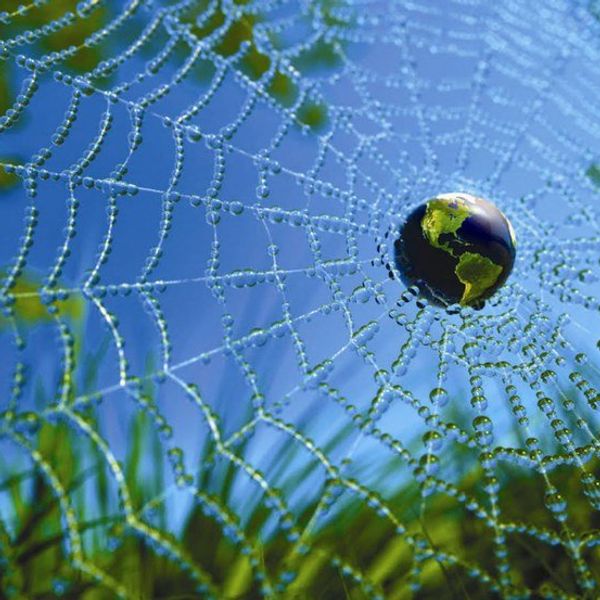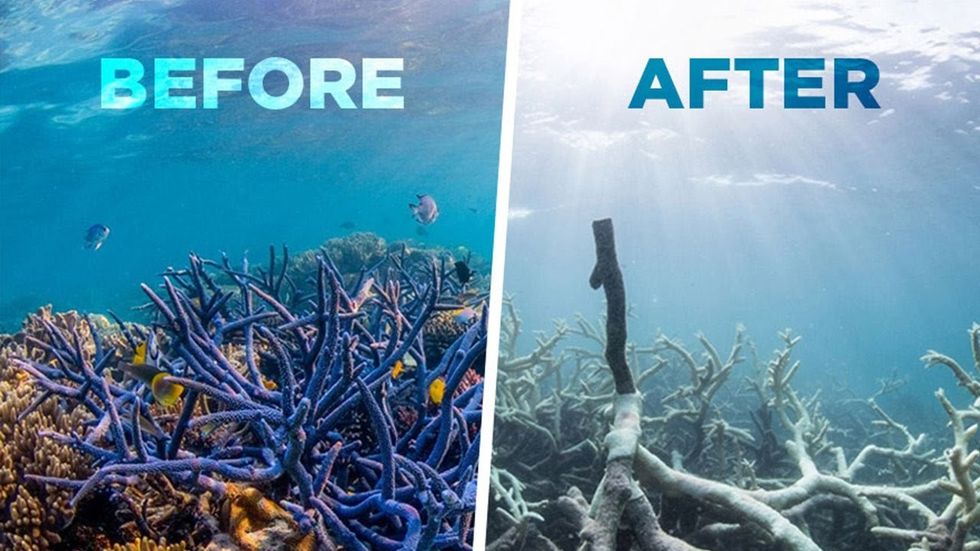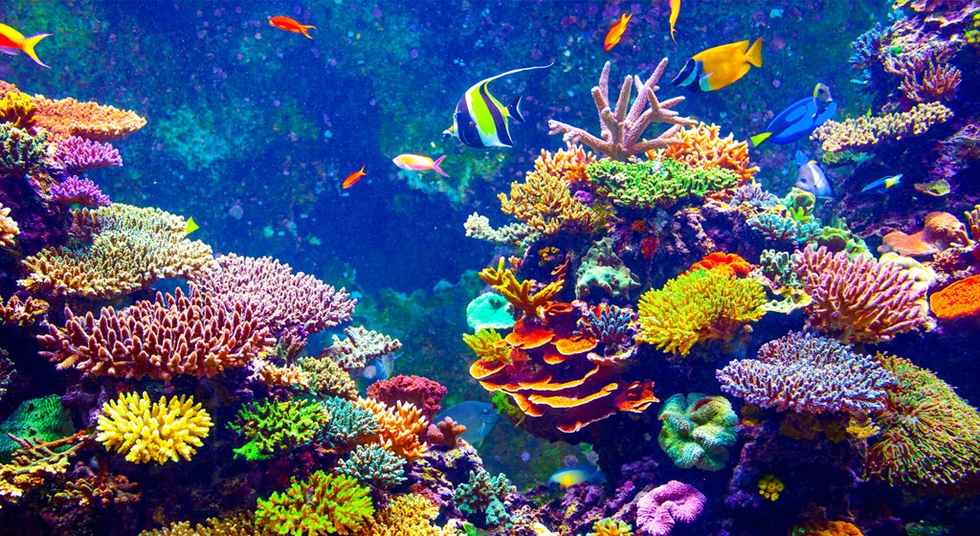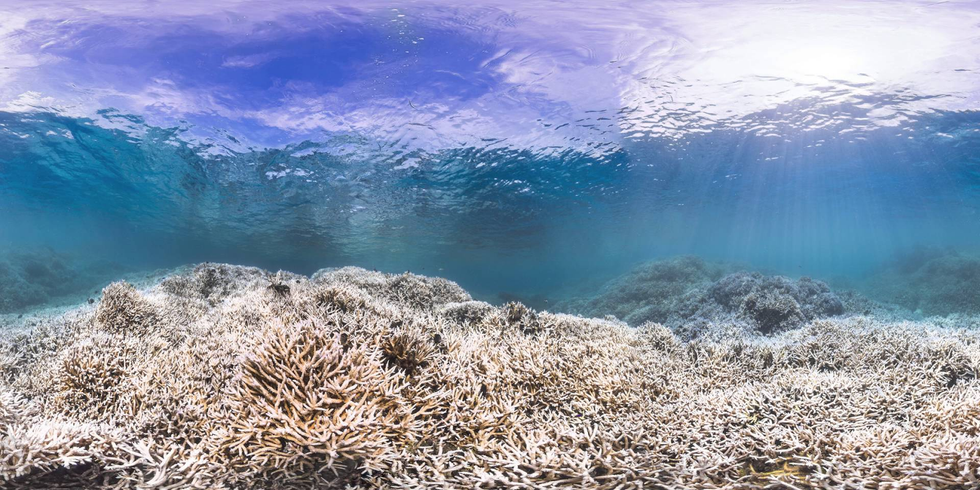While writing this article I came across a Netflix Original called Chasing Coral. I thought my online research was helping me get the message I wanted across to my audience, but after watching this documentary I truly saw the devastation coral reefs are undertaking and knew I needed to use the information Chasing Coral had to offer.
Reading data can only persuade the mind so much. Seeing truly is believing, so if you don’t think this article is enough to grasp the seriousness of coral bleaching, then I highly encourage watching this documentary. Few documentaries have resonated with my heart such as this one, perhaps it will with you as well.
Living on land rather than under water prevents us humans from truly grasping the importance of sea worlds. The ocean is like another planet, and that prevents our understanding of it and what services it contributes. Coral reefs are the perfect example of how ecosystem services benefit humans.
Corals come in all shapes, colors and sizes and there are thousands of coral species. An individual strand of coral is made up of millions of polyps. Polyps are actually invertebrate animals, not plants. Polyps can be described as tentacle sucking mouths that capture tiny organisms such as plankton, and individual polyps are typically the size of a pinhead.
Reefs, which are separate from corals, are the biotic result of coral formation over several generations of reproduction. These structures become so massive they can be seen from space. Thus, a natural habitat flourishes from corals.
The estimated one to nine million different species that live within coral ecosystems are what make them so profound and amazing. Biodiversity thrives within coral reefs, which create hatcheries and spawning areas for fish, plentiful food for competing species and simply beautiful arrays of colors that contrast with the shallow waters where reefs are typically found.
However, someone who frequently explored coral reefs 40 years ago would not be so inclined to describe today’s corals as beauty. Instead of describing a majestic water world site, we would hear something more like a grave site.
A thriving coral reef.
http://www.nationalgeographic.com.au/nature/is-sun...
For instance, our oceans have soaked up over a third all carbon dioxide (CO2) since industrialization began some 200 years ago. This is important due to the greenhouse effect CO2 contributes when stuck in the atmosphere. Yet, a study by Nature says carbon sequestration has slowed down 10% since 2000. This is due to the oceans not being capable enough to handle the amount of CO2 currently being released by anthropogenic (human induced activity) emissions.
Now you may be asking what do corals have to do with this? Well, with excess CO2, ocean acidification has caused chemical reactions due to lowered pH levels. This reduces carbonate ions that coral needs to create their shells in reproduction.
A bleached coral reef.
https://www.youtube.com/watch?v=pCj_IkB8svM
Moreso, the increased acidity of ocean waters also dissolves the calcium carbonate in the shells of living coral. So dissolving shells at an increased rate, and decreasing the rate at which new shells are formed, has been detrimental for coral reefs.
We have currently reached 400 parts per million (ppm) of CO2 in the atmosphere for the first time in over 400,000 years. If we reach 500 ppm it is believed that very little -- if any at all -- ocean area will support coral reefs.
When combining other anthropogenic causes such as 80% of shallow reefs that are overfished and 20% of reefs that are in danger from coastal construction due to sediment blocking light levels things start to look alarming.
Here’s a penny for your thought.
Warming the air leads to warming the oceans. A global rise in two degrees celsius gets thrown out on the news a lot and this probably seems like too small of a number to worry about. But just think, when a human body has a fever your body temperature may rise two degrees fahrenheit. As you recover you feel much better over a short period of time, but what if your body stayed at that temperature? Or worse -- your body continued to raise in temperature?
You’d die.
This increased temperature causes the corals to react to internal changes, just as animals do. The corals rely on the photosynthesis of plant organisms that live within them, providing food for the polyps in a process called symbiosis. The plant organisms are what die from increased water temperatures, leading to a process known as coral bleaching: the starvation of corals.
Within the last 30 years alone, we have lost 50% of the world’s corals.
https://www.livescience.com/52427-chilling-photos-coral-bleaching.html
Still wondering why this is a big deal?
Perhaps it involves the simple luxury of eating seafood. Or maybe you and your children will rely on an economic career that coral ecosystem services provide. And what about the medicine used to treat cancer patients?
According to the National Oceanic and Atmospheric Administration coral reefs support more species per unit area than any other marine environment. Reefs also provide erosion control and protect coastal wetlands as acting buffer zones, mitigating wave energy. Additionally, covering less than 1% of global surface, coral reefs provide up to $30 - 175 billion in annual economic value from fishing, coastal protection and tourism.
Around 500 million to one billion people rely on the unique biodiversity that coral reefs provide to local and global economies. The U.S. population is 323 million people for comparison. Just think how devastating this would be for people living in third world countries, or even U.S. citizens in Florida. Tourists would support local economies less frequently, leading to less business for retailers, restaurants and fisherman, which would cause unemployment, as well as lost natural coastal protection that potentially costs millions of dollars in aide.
And that’s not to mention the extinction of thousands of plants and animals.
This is why events such as pulling out of the Paris Agreement are such a huge deal for so many people. Climate change must be addressed in a timely manner and not put aside -- as it has been for decades -- by leaders of nations that are the primary contributors to increasing global temperatures.
Although there is still time to make steadfast changes, other problems will still persist. The frightening aspect of this is that coral reefs are just a miniscule part of economies suffering from climate change. This extensive research on the future of U.S. agriculture explains in more detail.
Now I encourage you to make your difference. It just may simply be mentioning it to someone else to bring awareness to coral reef depletion, or writing a blog like myself to educate those who don’t have time in their busy lifestyles to research, respectfully. If not I say go on vacation and check out the beauty of coral reefs for yourself, you may lose the chance if you never take it, sooner rather than later.
























